author - "Emerson Hough"
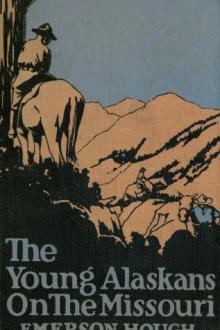
" said Uncle Dick, after a time. "I doubt if we could do it all the way by boat by September. But I'll see your teacher, here in St. Louis, where we're all going to winter this year, and arrange with him to let you study outside for the first few weeks of the fall term in case we don't get back. You'll have to work while you travel, understand that."The boys all agreed to this and gave their promise to do their best, if only they could be allowed to make this wonderful trip over

"The Mississippi Bubble" by Emerson Hough is a historical novel set in the early 18th century, following the story of John Law and the economic phenomenon that came to be known as the Mississippi Bubble. Hough skillfully weaves together historical facts and fictional characters to create a gripping tale of greed, ambition, and financial ruin. The novel provides a vivid and detailed portrayal of the social and economic conditions of the time, immersing the reader in the culture and

d bolder Europeans; and they moved westward, norcould have helped that had they tried. They lived largely andblithely, and died handsomely, those old Elizabethan adventurers,and they lie today in thousands of unrecorded graves upon twocontinents, each having found out that any place is good enoughfor a man to die upon, provided that he be a man.The American frontier was Elizabethan in its quality--childlike,simple, and savage. It has not entirely passed; for bothElizabethan folk and Elizabethan
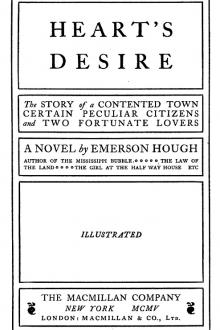
"Heart's Desire" is a novel written by American author Emerson Hough, first published in 1905. The story is set in the late 19th century and follows the adventures of a young man named Jack Winthrop, who leaves his comfortable life in the east to seek his fortune in the Wild West. Along the way, he falls in love with a beautiful woman named Helen Barnet and becomes embroiled in a range of exciting and dangerous situations, from gunfights and horse races to gold rushes and land
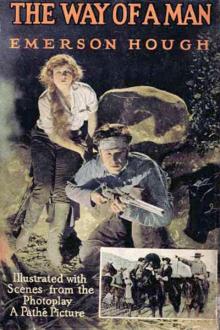
"The Way of a Man" by Emerson Hough is a classic novel that follows the life of John Wesley Pringle, a man who sets out to make a name for himself in the American West. Through his trials and tribulations, Pringle learns the value of hard work, integrity, and courage, ultimately finding success and happiness on his own terms. Hough's writing is both evocative and insightful, transporting readers to a bygone era of rugged landscapes and daring adventurers. Filled with memorable

; and the boat's going to start inside of an hour, and we're going to start with her!"Sure enough, when at last the heavy boom of the Yucatan's warning whistle caused the window glass along the main street to tremble, a little party once more wended its way down the sidewalk toward the wharf. Uncle Dick led the way, earnestly talking with three very grave and anxious mothers. Behind him, perfectly happy, and shouting excitedly to one another, came Rob, Jesse, and John. Each carried a rifle

e than any other of the owner's treasures. It was, curiously enough, to this little heap of literature that Wid Gardner presently turned.Forgetful of the hour and of his waiting cows, he sat down, a copy in his hands, his face taking on a new sort of light as he read. At times, as lone men will, he broke out into audible soliloquy. Now and again his hand slapped his knee, his eye kindled, he grinned. The pages were ill-printed, showing many paragraphs, apparently of advertising nature, in fine
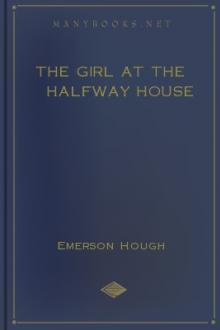
ew faces, many faces, long rows of faces, some pale, some red, some laughing, some horrified, some shouting, some swearing--a long row of faces that swept through the smoke, following a line of steel--a line of steel that flickered, waved, and dipped. CHAPTER III THE VICTORY The bandmaster marshalled his music at the head of the column of occupation which was to march into Louisburg. The game had been admirably played. The victory was complete. There was no need to occupy the trenches, for

r might have classed above herparents. They, moving from Kentucky into Indiana, from Indiana intoIllinois, and now on to Oregon, never in all their toiling days hadforgotten their reverence for the gentlemen and ladies who once weretheir ancestors east of the Blue Ridge. They valued education--felt thatit belonged to them, at least through their children.Education, betterment, progress, advance--those things perhaps lay inthe vague ambitions of twice two hundred men who now lay in camp at
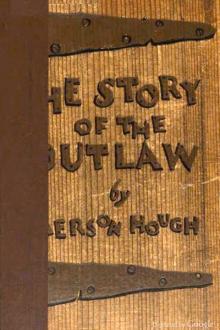
s life. He might go on now and become a bad man, or he might cheapen and become an imitation desperado. In either event, his third man left him still more confident. His courage and his skill in weapons gave him assuredness and ease at the time of an encounter. He was now becoming a specialist. Time did the rest, until at length they buried him.The bad man of genuine sort rarely looked the part assigned to him in the popular imagination. The long-haired blusterer, adorned with a dialect that

" said Uncle Dick, after a time. "I doubt if we could do it all the way by boat by September. But I'll see your teacher, here in St. Louis, where we're all going to winter this year, and arrange with him to let you study outside for the first few weeks of the fall term in case we don't get back. You'll have to work while you travel, understand that."The boys all agreed to this and gave their promise to do their best, if only they could be allowed to make this wonderful trip over

"The Mississippi Bubble" by Emerson Hough is a historical novel set in the early 18th century, following the story of John Law and the economic phenomenon that came to be known as the Mississippi Bubble. Hough skillfully weaves together historical facts and fictional characters to create a gripping tale of greed, ambition, and financial ruin. The novel provides a vivid and detailed portrayal of the social and economic conditions of the time, immersing the reader in the culture and

d bolder Europeans; and they moved westward, norcould have helped that had they tried. They lived largely andblithely, and died handsomely, those old Elizabethan adventurers,and they lie today in thousands of unrecorded graves upon twocontinents, each having found out that any place is good enoughfor a man to die upon, provided that he be a man.The American frontier was Elizabethan in its quality--childlike,simple, and savage. It has not entirely passed; for bothElizabethan folk and Elizabethan

"Heart's Desire" is a novel written by American author Emerson Hough, first published in 1905. The story is set in the late 19th century and follows the adventures of a young man named Jack Winthrop, who leaves his comfortable life in the east to seek his fortune in the Wild West. Along the way, he falls in love with a beautiful woman named Helen Barnet and becomes embroiled in a range of exciting and dangerous situations, from gunfights and horse races to gold rushes and land

"The Way of a Man" by Emerson Hough is a classic novel that follows the life of John Wesley Pringle, a man who sets out to make a name for himself in the American West. Through his trials and tribulations, Pringle learns the value of hard work, integrity, and courage, ultimately finding success and happiness on his own terms. Hough's writing is both evocative and insightful, transporting readers to a bygone era of rugged landscapes and daring adventurers. Filled with memorable

; and the boat's going to start inside of an hour, and we're going to start with her!"Sure enough, when at last the heavy boom of the Yucatan's warning whistle caused the window glass along the main street to tremble, a little party once more wended its way down the sidewalk toward the wharf. Uncle Dick led the way, earnestly talking with three very grave and anxious mothers. Behind him, perfectly happy, and shouting excitedly to one another, came Rob, Jesse, and John. Each carried a rifle

e than any other of the owner's treasures. It was, curiously enough, to this little heap of literature that Wid Gardner presently turned.Forgetful of the hour and of his waiting cows, he sat down, a copy in his hands, his face taking on a new sort of light as he read. At times, as lone men will, he broke out into audible soliloquy. Now and again his hand slapped his knee, his eye kindled, he grinned. The pages were ill-printed, showing many paragraphs, apparently of advertising nature, in fine

ew faces, many faces, long rows of faces, some pale, some red, some laughing, some horrified, some shouting, some swearing--a long row of faces that swept through the smoke, following a line of steel--a line of steel that flickered, waved, and dipped. CHAPTER III THE VICTORY The bandmaster marshalled his music at the head of the column of occupation which was to march into Louisburg. The game had been admirably played. The victory was complete. There was no need to occupy the trenches, for

r might have classed above herparents. They, moving from Kentucky into Indiana, from Indiana intoIllinois, and now on to Oregon, never in all their toiling days hadforgotten their reverence for the gentlemen and ladies who once weretheir ancestors east of the Blue Ridge. They valued education--felt thatit belonged to them, at least through their children.Education, betterment, progress, advance--those things perhaps lay inthe vague ambitions of twice two hundred men who now lay in camp at

s life. He might go on now and become a bad man, or he might cheapen and become an imitation desperado. In either event, his third man left him still more confident. His courage and his skill in weapons gave him assuredness and ease at the time of an encounter. He was now becoming a specialist. Time did the rest, until at length they buried him.The bad man of genuine sort rarely looked the part assigned to him in the popular imagination. The long-haired blusterer, adorned with a dialect that